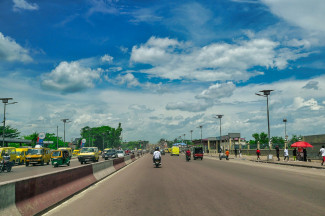Agriculture is a big deal for the 707,000 inhabitants of Solomon Islands, a collection of six major islands and hundreds of smaller isles sticking out of the South Pacific Ocean. It contributes a third of the country’s GDP and is a major source of jobs.
From the fertile land underfoot sprouts different types of yams, taros, cassava, bananas, sweet potato, sugarcane, breadfruit and other foods. But with more than 90 per cent of the country’s 28,400 square kilometre land area covered by forests and mountains, growing enough food for local consumption on what’s left of the islands is a national priority – so is producing enough for export.
Since 2019, the Ministry of Foreign Affairs and External Trade, with support from the Enhanced Integrated Framework (EIF), has been implementing the “Enhancing Capacity for Agriculture Trade” (ECAT) project across Solomon Islands. The Ministry of Health and Medical Services, and that of agriculture and livestock, are also involved. EIF is a multi-donor programme which supports Least Developed Countries to leverage trade to spur economic growth, sustainable development, and poverty reduction.
The project’s primary objective is to grow the economy and create jobs through systematic interventions in selected agriculture value chains and associated trade and export promotion activities. Broadly, the project does this by increasing production, improving the value chain, and building the capacity to export.
Ploughing through
The farmers targeted in the project belong among others to the Ghaobata Farmer’s Association, a collective.
Small grants have been made available to farmer groups and out-growers to buy farm tools and inputs. Crucially, more than 200 farmers were trained over two years in better farm practices and harvest management. These trainings took place on several islands, including Isabel, Temotu, Malaita and Guadalcanal.
Improved skills and mechanisation are raising yields and allowing for popular traditional crops like taro, a root crop, and cassava to be produced in sufficient quantities for export. A lot of the support is channelled through private sector players, like Goshen Enterprise Limited, which the government supported to develop a 20-hectare taro farm in Auki, Malaita Province.
Boosting production without off-take, however, is not enough. During the Covid-19 crisis in 2020, the government assisted Sape Farm, one of the biggest cassava and potato producing entities in Solomon Islands, with equipment to boost output and increase food security. The assistance contributed to a bumper crop, but with economic activity slowed down by the pandemic, it also led to a glut and wasted crops, losing the farm money.
Adding value to the chain
In 2021, Sape Farm started building a cassava processing plant to avoid future wastage and enable exports into international markets. But the farm soon ran out of cash for the equipment needed for the plant.
In November 2021, EIF stepped in with a USD $49,242 grant to buy the processing equipment from the overseas supplier. This would enable Sape Farm to process raw cassava into starch, flour and chips for domestic markets, as well as frozen cassava for export. It would also be Solomon Islands’ first proper cassava processing facility.
EIF had earlier funded the construction of a new National Public Health Laboratory office building and the purchase of lab equipment. The project also facilitated the calibration of the lab’s equipment to world standards.
Mr Dickson Manongi, the facility’s director, said 2023 will be a “historic moment” once the laboratory receives accreditation from the International Standards Organization (ISO) for the first time. This would allow for in-country safety and quality tests for food and water, and assure trading partners that products from the Solomon Islands adhere to global standards.
To improve post-harvest handling, the ECAT project also financed the construction of food crop storage facilities in different parts of Solomon Islands. This would reduce wastage while linking smaller farmers to the processing plants and eventually to export markets.
The taste of success
With increased production, better crop management, value-addition and quality certification in place, the next step was to find export markets. For taro, the project has worked with Goshen Enterprise, a private firm, to send product samples to New Zealand and Australia for testing.
For cassava, which has a readier market, the results are bulging like the tubers growing in the island’s fertile soils. The project has assisted Varivao Holdings, another private company, to increase its exports of the product to Australia.
Before the project started, the company and its allied farmers struggled to fill two containers for export per year, explained Benjamin Hageria, the general manager. In 2022, with training and machinery support from the project, they exported five containers of high-quality packaged yellow and white cassava, and are eyeing twice as many in 2023.
With better skills and more processing capacity, the firm exported its first container of frozen cassava to New Zealand and, with more where that came from, is looking for more overseas buyers.
In 2023, the Government of Solomon Islands plans to hold a National Trade Development Committee hoping to engage development partners in similar support going forward.
In February 2023, about two dozen better-skilled farmers in Totoba, a small village in Solomon Islands, stood patiently in a large clearing to receive a new tractor and plough. At the handover ceremony, Mr James Tiva, the leader of the collective, said they have been identified to supply taro to the 2023 Pacific Games when they come to Solomon Islands for the first time at the end of the year.
With new skills, infrastructure and some horsepower behind them, the farmers here are hoping to win in the fields, and on the field.
If you would like to reuse any material published here, please let us know by sending an email to EIF Communications: eifcommunications@wto.org.


